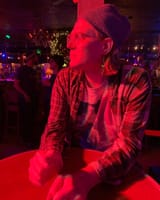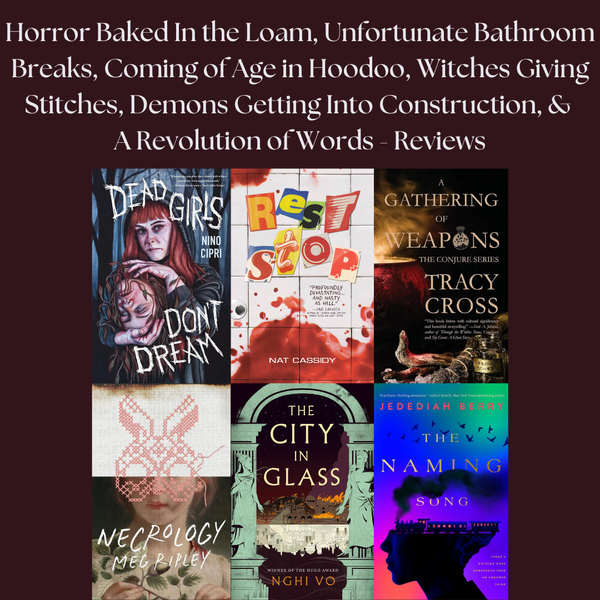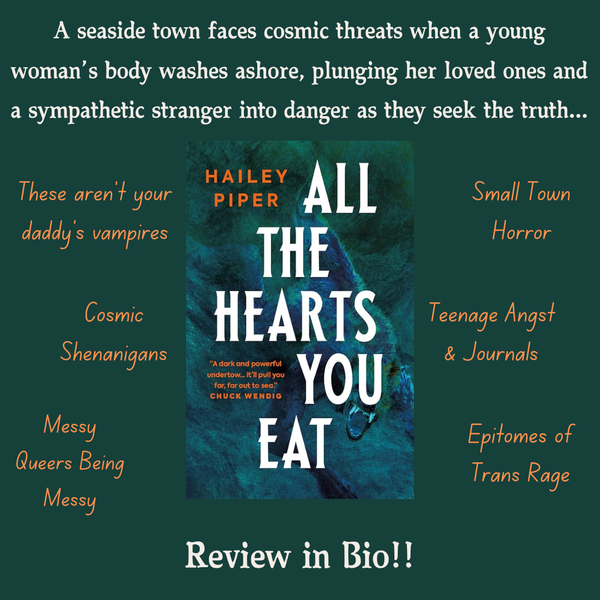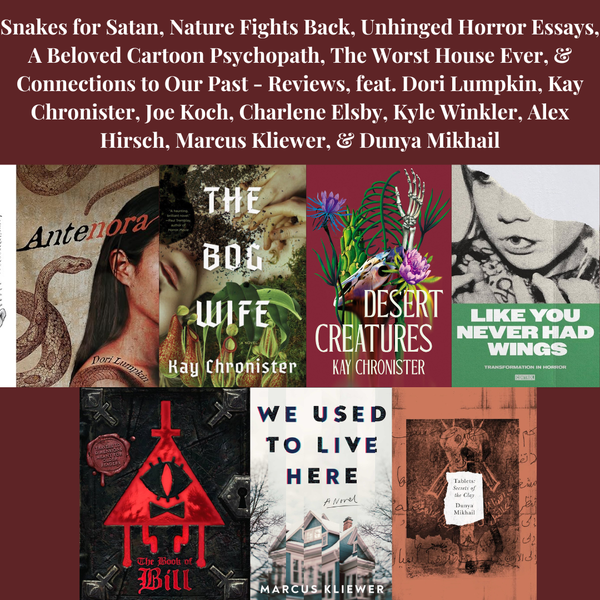Night of the Living Identities - A Review of Chuck Tingle's "Bury Your Gays"
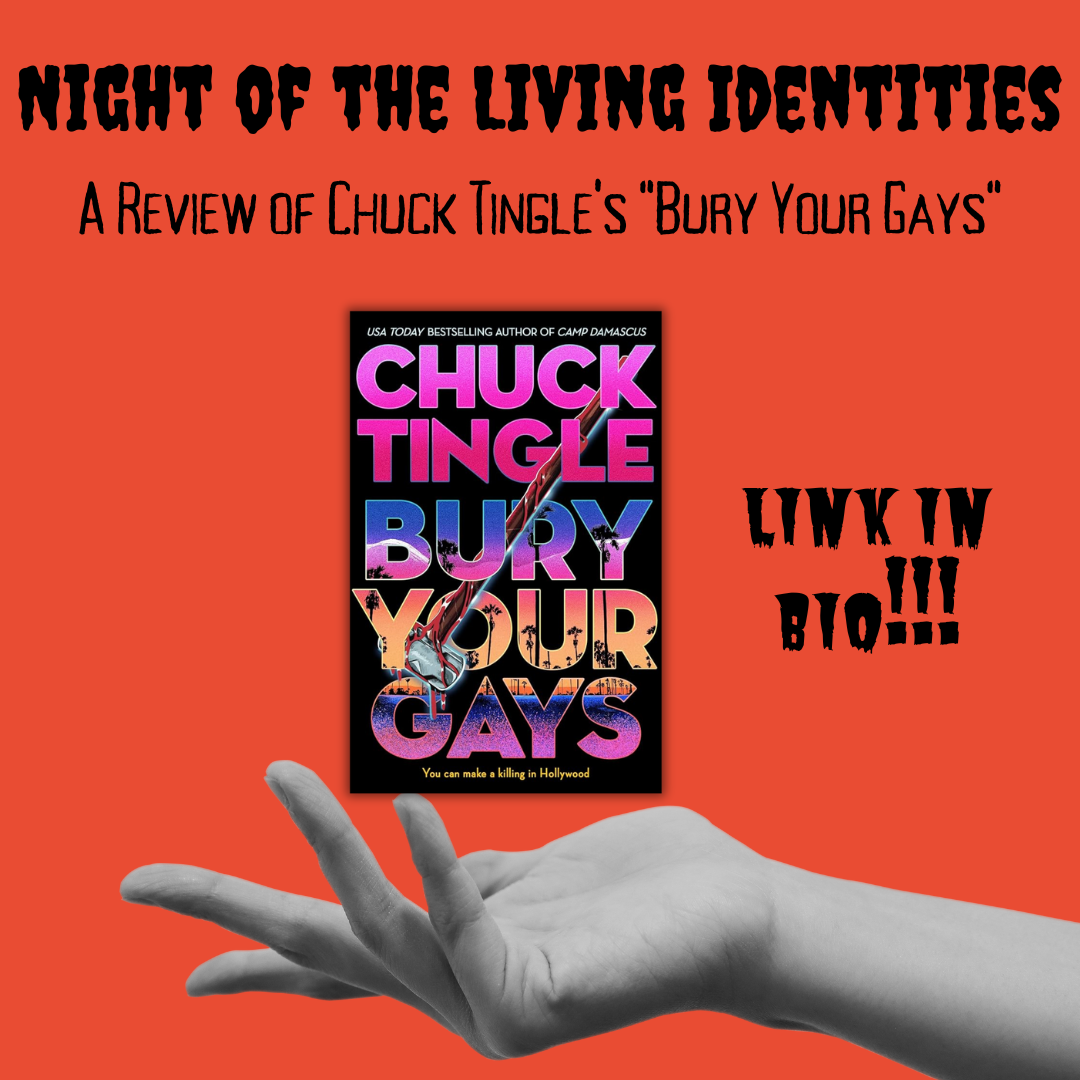
It's a sunny and decently well-temperate day in Philadelphia. Often on days following heat-waves or other extreme weather, I find myself taking the world in anew. While this sometimes feels rather silly, given that no true change has taken place, it could in part be due to a shift in comfort.
Sensation is important to a neurodivergent little goblin like me, so I endlessly struggle with high heat. It often causes me to ignore just about everything around me, aside from work, because the heat truly saps my energy. Compound this with a general irritation at temperature discomfort and exhaustion and we have a true mess on our hands.
However, I love seeing the wind whip through trees and their leaves. My heart swells seeing kids out at parks, simply living. It's these little things that help bring me out of myself. As much as I like to joke about how cynical I can be, it's difficult to hold onto such a feeling, which honestly does seldom help me in fighting my depression and anxiety.
So much of our societal makeup is centered around separation, exclusion, and capital D-epression as a means to keep us focusing on, or analyzing further, the things/structures/people that cause it. Humans are not meant to hate one another, and an author I always turn to when I need these reminders is Dr. Chuck Tingle, the ultimate buckaroo.
Last year Mr. Tingle's already sizable star in the world of literature nearly supernova-ed with the release of his "traditional publishing" debut, Camp Damascus, from Tor Nightfire. I couch traditional publishing in quotes because this wildly talented author has been publishing for years, and to call Camp Damascus his "first real book" is not only disingenuous, but incredibly gatekeepy and obnoxious. It's this same tomfoolery that led to the 2016 Nebula Awards debacle (if that raised your eyebrows, go look it up now and be astounded).
The fact that it took a bunch of right-wing trolls attempting to "own the libs" through rigging/delegitimizing a high-profile awards ceremony for people to suddenly realize who Chuck Tingle is is not only hilarious, but completely proves this point. The Nebula's didn't entirely see his work as legitimate regardless of the fact that the man has cranked out several erotic-yet-heartfelt sci fi fantasy novellas, coloring books, and much more. Tingle has published outside of the predetermined lines for so long, and it's due to this steady growth that the world received his debut horror full-length with a shower of praise.
"But how in the hell did this guy get so many fans by writing erotica?" I can hear you shouting in Bootstraps Capitalism. A large piece of this cosmic puzzle is painfully simple: Chuck Tingle gives a shit about writing, people, and the world around him. Being a bisexual taekwondo grandmaster, he has connected immensely to the queer community, transcending gender and sexuality through his erotica and romance pieces, including bisexual Mothman and the Harriet Porber novellas that stand as Tingle's direct clapback at the British witch nazi herself.
Regardless of genre or aim, his work focuses predominantly on hope and love because "love is the most important tool we have when resisting the endless cosmic void," as per his website. I can feel many cynics bristling at this, calling it childish and simplistic–It can't be that simple. Well, sure, there are plenty of shades of gray throughout the world, but hope will always be useful tool in battling the cynicism and apathy encouraged by white supremacy and western ideology. Tingle's work could simply exist in a pleasant vacuum of hope, love, and endless optimism, as authors such as TJ Klune have shown us time and time again. There is absolutely space for these kinds of novels. However, Chuck Tingle healthily balances the personal and political, providing absolutely compelling stories of queerness and revolt within structures and spaces that seek to suppress us.
This brings me finally to our discussion for today, Tingle's newest release from Tor Nightfire, Bury Your Gays, which will release next Tuesday, July 9th.
Official spoiler alert, as I will be digging deep into the novel itself. So be warned...
What does "bury your gays" even mean?
To begin, we must address the book's title, which is not to be confused with Sofia Ajram's queer horror anthology released earlier this year. The phrase "bury your gays" refers to a long-standing standard throughout media, but most especially visual media, where if there happens to be a queer character in your media, there is most often an expectation that those characters will meet some sort of brutal, tragic, or sudden demise. Think about the myriad television queer romances that witnessed heartbreaking ends with examples such as Buffy the Vampire Slayer, The 100, Supernatural, and an Ouroboros CVS receipt length of countless others.
While this trope may appear to be an invention of ignorant or hateful studios and executives, the history is a bit more complicated than that, stretching back even farther than fandom itself. As writer and researcher Haley Hulan describes in her piece, "Bury Your Gays: History, Usage, and Context," the trope can be dated as far back as the 19th century, functioning as a way for queer storytellers to write about their experiences without fear of societal or legal backlash. This fear was prompted by the passing of acts such as the 1885 Criminal Amendment Act which outlawed what were perceived as "perverse acts" performed by men–but also women–with many authors needed to sneak their way around censors, while also being true to their identities.
Looking to authors such as Oscar Wilde, Jonathan Larson, and many more, Hulan outlines how writers have utilized this trope for means of refuge, highlighting the very real trauma experienced by those who were forced to kill their characters to protect themselves. Unfortunately, the trope has endured throughout the 20th and 21st centuries in both print and visual media, with the period of the 80's to early 00's standing as an especially vitriolic time for trans and gender-creative folks. If you're curious to learn more about the history of this trope, I have linked Hulan's excellent essay above.
While entertainment has certainly come farther than one might expect in regards to the treatment of queer characters, the trope still endures. Whether through well-intentioned writers seeking to up the drama of their respective IP, or the ghoulish TV execs who really don't care who lives or dies, simply as long as the property is making money, well, wHo CaReS???
Where does this book fit into that though?
At the beginning of Bury Your Gays, we're introduced to Misha, a fairly successful writer within this fictional Hollywood. He's arriving at the production lots to have a meeting with his friend and executive big-wig, presumptively involving Misha's recent Oscar nomination. What our narrator is not expecting, however, is for this producer to tell him the higher ups have requested him to kill off his current main leads of his successful sci fi show, completely disregarding Misha's hope to confirm their relationship and happy ending with the impending season finale.
Naturally incensed and not looking to contribute to the tropes that haunted his childhood, Misha outright refuses, regardless of the grim warnings that the producer offers. So what, if they fire him, so be it. But it would seem that the higher powers are not interested in a simple firing. With the brutal and sudden murder of a sleazy director occurring directly in front of him, situations grow increasingly stranger as people seemingly dressed as characters from Misha's show begin to stalk and intimidate him, with a media campaign questioning his every move, as well as his sanity.
You can kind of figure out where this is going, right? The ghoulish executives are obviously attempting to strong-arm Misha into burying his gays, but this is where the proverbial rug comes right out from under your feet.
What do you do when your past is legitimately haunting you and harming your loved ones?
This being a Chuck Tingle novel, nothing is exactly as it seems. One of the best aspects of Camp Damascus is how expertly he keeps his cards to his chest until its whacky reveal and climax. To say you can never exactly pick up on where a Tingler is heading before you get there is an immense understatement. This extends even into cover design for our dear author, so let's talk about the cover art for Bury Your Gays.
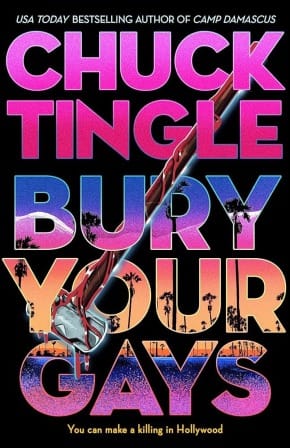
I want to start by merely appreciating how fucking gorgeous and, more importantly, intentional this cover is. With the massive success of Ti West's X Trilogy, buzz has been exploding over the rapidly approaching MaxXxine, the epic conclusion to what feels like the first massively successful slasher in decades–it's not surprising that Bury Your Gays cleverly plays off of the Hollywood hyperfocus present in West's upcoming release.
Aside from the very queer-focused coloring of the text, the inclusion of a stylish, bloody sledgehammer plays into this hype, making the novel sound like a sleek slasher, but characterized by Tingle's cooky charm. At least, this was kind of what I expected going in. However, both title and cover are enormous MacGuffins that completely set up the central themes and twists to come. Last chance warning, because this is where we REALLY get into spoilers for the plot and twists, so please proceed responsibility.
So how does our brilliant buckaroo use title and design to mess around with his audience? Well, to start, Bury Your Gays is not a slasher. At least not in the classic sense. At a certain point, we begin to alternate chapters, with many informing us of Misha's upbringing and connection with media that relied on queerbaiting and the bury your gays trope. We are additionally introduced to the traumas and characters who greatly effected Misha and his own sexuality.
A large focus of this novel is Misha's contentious relationship with his publicly undisclosed queerness and identity. He is in a fantastic relationship with his current boyfriend, but experiences extreme anxiety surrounding the world knowing this. Obviously no person owes the public their disclosure, and the unfortunate glut of instances in which actors, writers, and even directors have felt pressured into disclosing their queer identity has been a growing issue within the conversations surrounding who gets to tell or act the experiences of queer people.
Misha is not ashamed of who he is, however, he is understandably traumatized not only by his needing to hide his sexuality for most of his high school experience, but also from his extremely abusive and exploitative uncle. Is Misha burying is own queerness by not living as openly as he desires and deserves to? While we owe nothing to a larger public, what does it mean when we're hiding from our own identity?
Much of this comes to a head following a fairly awkward school reunion, where our hero encounters a particularly dangerous villain from his series, an alien whose touch causes people to see the cosmic ending of our existence, thus causing victims to descend into complete existential defeat and despair. While Misha just narrowly avoids the deadly touch, he later learns that his boyfriend and best friend are afflicted, truly bringing the harm of this absolutely insane nightmare right to his doorstep.
Much of this action leads to the revelation that what is truly behind this increasingly maddening ordeal is an intensely sentient series of artificial nanobots have been manifesting themselves as the ghosts of Misha's past as a means of getting him to go through with killing his characters and thus fulfilling the algorithmic cycle of harm that has plagued entertainment for so long, or killing him–and his career–in the process. WHAT???
Holy shit it was AI the whole time????
Yes and no. While the main villain of the book is absolutely the corporate greed and disturbing exploitative nature of Hollywood, as displayed in an early gag that a recently-deceased actor was being recreated by the production company that created this destructive nanotechnology, the true lesson of Bury Your Gays comes in its powerful climax.
What quickly becomes evident to Misha is that to beat this campaign to destroy his life, he must fully embrace himself and trust the world to embrace him in all of his beauty and complexity. Delivering an empowering and tear-worthy speech, our hero quickly turns the tide on his public image, and with an upload of a virus that seems to defeat the nanobots themselves, the new status quo presents itself in the most hilariously over-the-top, pandering pro-gay shift in all of Hollywood, providing one final jab at the opportunistic nature of capitalism and its love for a narrative it can pick off of.
While this may seem a rather sardonic and cynical ending to a tale of embracing yourself and your identity, the focus of Tingle's ending is not this lampooning of entertainment, but in how powerful a simple act of being true to yourself and loving without fear can truly be. Misha didn't defeat the enemy by smashing it with a sledgehammer or the various other ways slasher characters attempt to bring down the supernatural forces that won't seem to quit. He did it by being true to himself and his loved ones.
We love it when a concept comes together...(inserts cigar into mouth)
Mirroring Rose, the incredible protagonist of Camp Damascus, Misha's journey has become a touchstone of Chuck Tingle's repertoire. The reasons these solutions seem so simple is because they are. Rose is able to defeat the corporation summoning and exploiting the demons by being true to herself and not giving up on the girl she loves, while Misha embracing his whole identity is what helps to bring much of the danger bred from corporate greed.
Additionally, community is very much at the heart of these two novels, eschewing the sole-heroes-journey slop we've been fed for hundreds of years. These characters succeed because they refuse to go it alone and recognize there's no purpose in going it alone. If we attempt to change the world with individual love, we will always be stopped before we even reach the castle gates, but if we come together in our quest for love and healing, create a united revolutionary front, there are more chances we take down the forces seeking to destroy our lives for more and more money.
Bury Your Gays is exactly what it says on the tin, but what's most exciting is your not privy to the full scope until you experience the novel for yourself. With his second Nightfire release, Chuck Tingle proves yet again that he is a master at spanning horror, humor, and heartfelt storytelling that has the ability to change the world, or, at the very least, inspire readers to want more from the world around us. Like the best speculative fiction, he presents us with characters who simultaneously perfectly inhabit their fantastical worlds AND express a degree of real experience that readers can find themselves in the characters.
To have the privilege of reading and talking about Chuck Tingle in 2024 is nothing short of a momentous miracle of magic. Where so much of fiction can feel jaded and cynical, this buckaroo finds a way to bring us right back to hope, gifting us with another way in a world hell-bent on attempting obfuscate better alternatives.
If you loved Camp Damascus, then there is so much to love about this astounding follow-up. Be sure to secure your copy next Tuesday.
*also apologies for the A-Team reference...
